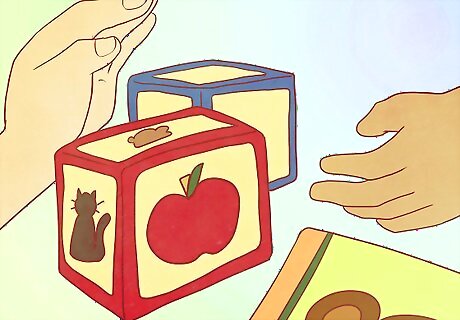
views
Sing to them and with them.

The first key to teaching a nursery rhyme is to expose them to it, a lot! Be prepared to be silly and goofy with them. Sing it to them when they're young and you're getting them to sleep or changing their diapers. Sing along with them once they're older, in their car seat or while they're playing. Be prepared to rhyme and sing until the tunes and words are just naturally drilled into them.
Be patient.

Memorizing anything requires patience. Nursery rhymes should be fun, not a taxing chore. Your child may mix up the words, sing the wrong tune, or even get creative and sing the wrong rhyme on purpose; this is perfectly okay, and you must remain patient. If you feel any deficiency in your child’s progress, sing the same poem to them, during play and other relaxing activities, again and again. Understand that the repetitive quality of nursery rhyme phrases helps in memorizing them.
Use rhythm.

Avoid a monotone voice. You must be cheerful when teaching nursery rhymes and this should be heard in your voice. Encourage them to do the same, i.e. repeat the rhymes after you in a fun and rhythmic tone. Use hand gestures if you want to This will add creativity, cognitive abilities, improves hand to eye coordination and encourages thinking.
Follow up with questions that encourage their memory-making.

Use this natural skill of every child to your great advantage. After you teach about a certain nursery rhyme today, ask questions about it tomorrow before starting the next rhyme. For instance, you can ask questions like “Where was Humpty Dumpty sitting?”, “Why couldn’t the soldiers fix him?”. This is the quickest way to get them to memorize a rhyme and it works faster if you give little prizes for every right answer.
Draw patterns.

Children often take great interest and pay special attention to drawing activities. Use this to your advantage by helping them learn a vast number of nursery rhymes. You can engage yourself in this activity with your child by drawing a character from a certain rhyme you wish to get your child memorized. For instance, you can sing together ‘Humpty Dumpty’ with your child and then draw Humpty on a paper and ask your child to identify it and relate to that rhyme. This activity will greatly enhance the memory and association skills.
Use toys and play.

You can employ the use of many useful instruments. Building blocks, puzzles, mazes, and booklets each have their own advantages. Ask your child to build a wall from which Humpty fell, finish the puzzle diagram of a scene from ‘Johnny Johnny Yes Papa’ and so on. This will greatly enhance memory, reasoning, association and problem solving in the child.




















Comments
0 comment